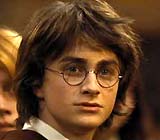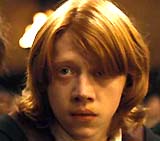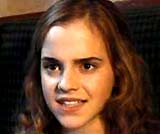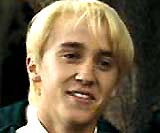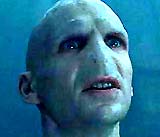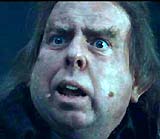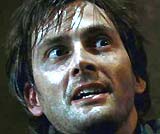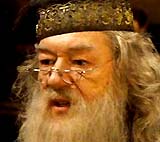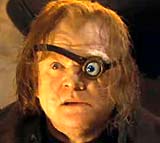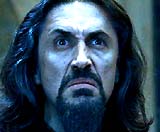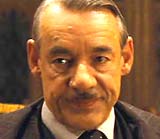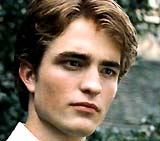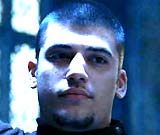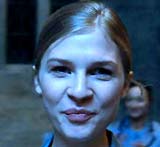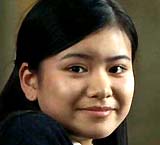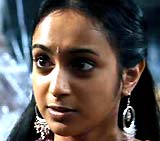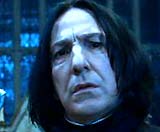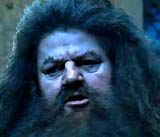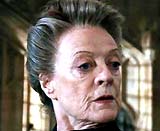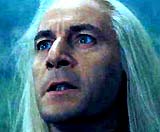| Harry Potter and the Order of the Phoenix (2007)
d. David Yates, 139 minutes Film Plot Summary During the scorching summer before his fifth year of studies at Hogwarts School of Witchcraft and Wizardry, young Harry Potter (Daniel Radcliffe) was forced to use his underaged wizardry skills outside of school - he was acting in self-defense to deter an attack of two Dementors against himself and teasing fat cousin Dudley Dursley (Harry Melling) - a Muggle (non-magical person), in an underground tunnel. When the Dementors began to suck their lives away, Harry called up a Patronus charm ("Expecto Patronum") with his wand to drive them away. In the Dursley household at Surrey, where he lived with his Uncle Vernon (Richard Griffiths) and Aunt Petunia (Fiona Shaw) during the summers, Harry received a letter from the Ministry of Magic, informing him that they had detected his performance of the Patronus Charm in the presence of a Muggle. It was a clear violation of the Decree for the Reasonable Restriction of Underage Sorcery, and he was to be expelled from school. Dudley's parents took their son away for medical treatment. Harry was still having recurring nightmares of events in the previous film - Lord Voldemort's murder of classmate Cedric Diggory. He was visited by one of his Hogwarts teachers, Professor Alastor "Mad-Eye" Moody (Brendan Gleeson) and others (including Kingsley Shacklebolt (George Harris) and Nymphadora Tonks (Natalia Tena)), and told that Hogwarts Headmaster Albus Dumbledore (Michael Gambon) had persuaded the Ministry to suspend the expulsion, pending a formal hearing. As part of their rescue plan, they flew off on broomsticks with Harry to London, where he was escorted into the secret home of his godfather Sirius Black (Gary Oldman). A private discussion was being held in a meeting room of Order of the Phoenix members, as Harry ascended the stairs to his room and saw Black's house elf Kreacher (Timothy Bateson) mumbling to himself. He was greeted by his best friends Hermione Granger (Emma Watson) and Ron Weasley (Rupert Grint), who told him he was at the headquarters of the Order of the Phoenix (a secret society composed of a group of wizards, founded by Dumbledore), formed fourteen years earlier. [A number of the original members had been killed by Voldemort in the meantime: Marlene McKinnon, Frank and Alice Longbottom - the parents of student Neville (Matthew Lewis), and Harry's parents.] During dinner, Harry learned that his hearing would be held before the entire Wizengamot of the Ministry of Magic, headed by its imperious leader Cornelius Oswald Fudge (Robert Hardy). Under Fudge's influence, The Daily Prophet wizard newspaper had been printing accusatory stories, one of which called Harry: "The Boy Who Lies." [Another claimed: "Dumbledore: Daft or Dangerous?"] Sirius explained how there was a smear campaign against anyone who claimed that the Dark Lord (Voldemort, or You-Know-Who) had returned. Fudge, clearly "twisted and warped by fear" and not in his right mind, according to ex-teacher Remus Lupin (David Thewlis), didn't believe that Voldemort was back, and was avoiding "facing that terrifying truth." Black believed Voldemort was again building up his army of witches, wizards, and dark creatures. Harry was accompanied to the Ministry of Magic and its Department of Mysteries by Ron's father Arthur Weasley (Mark Williams). Harry faced a disciplinary hearing-trial on the 12th of August for producing a Patronus Charm in the presence of a Muggle; defense testimonies were given by Harry's neighbor Mrs. Arabella Figg (Kathryn Hunter), who claimed she witnessed the unauthorized attack of the cloaked creatures, and by Dumbledore, who claimed Harry's self-defensive use of magic before Muggles was due to the life-threatening situation. Dumbledore implored Fudge for reason: "The evidence that the Dark Lord has returned is incontrovertible." After a vote, Harry was cleared of charges, and he was off to school at Hogwarts on the express train with his friends. He continued to suffer hallucinatory dreams of death and visions of Voldemort. When he arrived at Hogwarts with Ron, Hermione, and Neville, Harry was the only one to see a large Thestral creature pulling their carriage. In their carriage was an odd girl named Luna Lovegood (Evanna Lynch) who claimed he wasn't going mad: 'I can see them too. You're just as sane as I am." During the opening school dinner, Dumbledore announced two staffing changes: the returning Care of Magical Creatures Professor Grubbly-Plank while Hagrid (Robbie Coltrane) was on temporary leave, and the new Defense Against the Dark Arts teacher - the pink-clad Professor Dolores Umbridge (Imelda Staunton). She was one of the senior Ministry officials who had voted for expelling Harry during his hearing/trial - Hermione rightly sensed that the Ministry was interfering at Hogwarts. And the wizard newspaper continued to print articles against Harry (and Dumbledore), causing some students to be suspicious of him and call him a liar. In Professor Umbridge's class, the authoritarian instructor insisted on strict discipline and a new curriculum: a "carefully-structured, Ministry-approved course of defensive magic." She promoted teaching theory ("theoretical knowledge") rather than practical magical defensive spells: "You will be learning about defensive spells in a secure, risk-free way." Harry questioned: "How's theory supposed to prepare us for what's out there?" and she replied: "There is nothing out there, dear." She was of the belief that Lord Voldemort did not exist and had not returned: "This is a lie." When Harry claimed he had seen Voldemort and fought against him (and that Voldemort was responsible for Cedric Diggory's death), he was punished for outspokenness about Voldemort's return and given a detention. Harry was forced to write: "I must not tell lies" using one of her special quills without ink (the phrase painfully appeared in blood on his left hand, creating a scar). She told him that he deserved to be punished. His friends urged him to report the 'torture' that he was receiving from Umbridge, but he refused, claiming it wasn't "simple" and that they didn't understand. Feeling alone as winter approached, Harry wandered into the forest where he found Luna tending to the strange-looking Thestrals, the gentle winged horse creatures that only they could see pulling the carriages. She explained their unique ability: "They can only be seen by people who've seen death." Luna's mother had died - she was an extraordinary witch but one of her spells "went badly wrong" when Luna was nine years old. She told him she believed his story about Voldemort's (He-Who-Must-Not-Be-Named) return, Harry's struggle against him, and the Ministry's and Prophet's conspiracy against Harry and Dumbledore. She thought Voldemort was deliberately making Harry feel alone, to minimize his power as a threat. Umbridge exercised further control over the school, announcing: "Things at Hogwarts are far worse than I feared." She was determined to loyally follow the Ministry of Magic's orders to immediately clamp down on the school and its teachings, by issuing a series of restrictive proclamations. She first appointed herself to the position of Hogwarts High Inquisitor, as the Daily Prophet described a new era of educational reform. The paper also claimed that public confidence in Dumbledore was dwindling. Parents endorsed the Ministry's new initiatives, to "address the seriously-falling standards" of the school. She forbade public kissing, sloppy uniform dress, and student playfulness. More proclamations were issued: No music during study hours, the banning of all Weasley products, and the maintenance of proper dress and decorum. Thick-glasses wearing Professor of Divination Sybil Trelawney (Emma Thompson), a teacher for 16 years, was fired and banished from the grounds for not offering up a prophecy to Umbridge's liking, to which Dumbledore objected and reversed the banishment. The trio of Ron, Harry, and Hermione (who claimed: "She's taking over the entire school") were concerned about the latest happenings, and learned from Sirius Black (through embers in the fireplace) that "Fudge doesn't want you trained in combat." Fearing that they were forming a 'wizard army' at Hogwarts and that "Dumbledore is assembling his own forces to take on the Ministry," the paranoid Fudge was endorsing Umbridge's clamp-down, and "blocking the truth." Black warned: "Voldemort is on the move." To properly defend themselves, they created a group called Dumbledore's Army (DA), composed of about 20 students to whom Harry would teach special defensive magic skills, such as spells to summon protective spirits. The students knew that Harry had wizarding experience: he had produced a Patronus Charm, killed a Basilisk with the sword in Dumbledore's office, fought off hundreds of Dementors at once in his third year, and the previous year had fought off "You-Know-Who" in the flesh. He modestly told the students he was lucky and always had help, and that "facing this stuff in real life is not like school." The newest Umbridge proclamation was: the disbanding of all student organizations (any one in non-compliance would be expelled). However, Neville discovered the Room of Requirement - a secret "Come and Go Room" that appeared since they had "real need" of it for their secret meetings: "It's like Hogwarts wants us to fight back." They practiced magical defenses and spells, with commands such as Expelliarmus, Stupefy, Diminuendo, Levicorpus, and Reducto. As the group took a break for the Chrismas holidays, Harry realized he had fallen for fellow student Cho Chang (Katie Leung) - who complimented him on his teaching, and they kissed under a mistletoe. She was still grieving over the loss of her ex-boyfriend Cedric Diggory, although recovering with her new love for Harry. When infractions were suspected, two other Educational Decrees were ordered: All students had to submit to questioning about suspected illicit activities, and Those wishing to join the Inquisitorial Squad for Extra Credit could sign up in the High Inquisitor's Office. Slytherin Draco Malfoy (Tom Felton) and other students were recruited by Umbridge to form an Inquisitorial Squad to spy and report infractions. Then, Harry experienced another nightmare, of Voldemort (as a snake) attacking Mr. Arthur Weasley in the Department of Mysteries. In fact, Weasley was "gravely injured" in an actual bloody attack, during which the Dark Lord "failed to acquire it" - Voldemort was seeking something not yet identified. Harry desperately asked: "What's happening to me?" Professor Snape was instructed by Dumbledore to give Occlumency lessons to Harry to shield him from the telepathic "connection between the Dark Lord's mind" and his own. If Voldemort was aware of the connection, he could exploitatively access, influence, read, control and unhinge Harry's mind. He might invade the victim's mind "creating visions designed to torture them into madness." [Later, Harry confessed: "I was the snake." He feared he was becoming more like Voldemort.] During the holidays, Harry resided at Sirius Black's home (actually his parents' house) in London, where cantankerous, unpleasant house-elf Kreacher greeted Harry as "the boy who stopped the Dark Lord. Friend of Mudbloods and blood-traitors alike." Sirius Black showed Harry his Black family tree, and spoke of his deranged cousin Bellatrix Lestrange (Helena Bonham Carter). When school recommenced, gamekeeper Hagrid (Robbie Coltrane) returned from temporary leave. Dumbledore had privately sent him to "parlay with the Giants" to convince them to join the cause. Death-Eaters were also recruiting them to join the cause of You-Know-Who. Hagrid was worried: "There's a storm coming, Harry." Death-Eater Bellatrix Lestrange escaped from the prison at Azkaban with nine other high-security prisoners when the walls crumbled. Other Daily Prophet headlines: "Ministry Angers Centaurs." Fudge announced that the mass breakout was thought to have been engineered by "notorious mass murderer" Sirius Black. Fourteen years earlier, Bellatrix Lestrange used a Cruciatus Curse on Neville Longbottom's parents to kill them. The Dumbledore Army's secret practice room was discovered by sinister but mousy Umbridge, and she reported it to the Ministry's leader Cornelius Fudge, who feared that Dumbledore was trying to destroy them. They had interrogated Harry's girlfriend Cho (with Veritaserum) and learned of its existence. When Dumbledore admitted he had instructed Harry to form the organization, he took full responsibility - and Fudge ordered him to be arrested and taken to Azkaban "to await trial for conspiracy and sedition." Dumbledore dramatically escaped with the aid of his Phoenix Fawkes. Argus Filch (David Bradley) posted the latest proclamation -- Umbridge was to become Hogwarts' new Headmistress after Dumbledore was ousted. The school became more of a lifeless, imprisoning existence under the rule of the "old hag" - who began to use corporal punishment. Hagrid led the trio (Ron, Harry, and Hermione) into the Forbidden Forest, where they saw a herd of Centaurs riled up over the Ministry's restriction of their territory. He forecast that he would be fired by Umbridge in the near future, and introduced them to his simple-minded, Giant half-brother Grawp (Tony Maudsley), so that they could look after him when he was gone. The Weasley twins Fred and George - riding on broomsticks, caused riotous chaos and disruption during Year 5 O.W.L. exams (on "Theory of Charms"), by setting off fireworks in the Great Hall. All of the framed Proclamations crashed to the floor as the twins flew away - applauded by their classmates. Simultaneously, Harry collapsed as he experienced another nightmarish vision within the Department of Mysteries, of Sirius Black being tortured with a "Crucio" curse by Voldemort, in order to give him a "prophecy." The trio planned to use the Floo Network (transport through the chimneys) to get to Sirius, but they were interrupted by Umbridge. Hermione cleverly thought up a way to trick and lead Umbridge into the Forbidden Forest, to locate "Dumbledore's secret weapon." Hermione, Harry, and Umbridge came upon Grawp's hiding place, but the Giant was missing. Umbridge realized she had been tricked, when a group of angry, weapon-bearing Centaurs approached. After she insulted them as "creatures of near-human intelligence" and "filthy half-breeds," and used an "Incarcerous" curse on one of them, they seized her and carried her away. Afterwards, the group of six students (the trio and Luna, Neville, and Ginny Weasley) flew on the backs of Thestrals to the Ministry of Magic in London, to save Sirius in the Department of Mysteries - the locale of all of Harry's nightmares. In the film's climax, Harry and others were lured to the Dept. of Mysteries to save Harry's godfather Sirius Black, who was trapped there. Harry retrieved his own sphere that spoke a prophecy, stating: "For neither can live while the other survives" - the fact that Voldemort and Harry couldn't co-exist. One of Voldemort's Death Eaters, Lucius Malfoy (Jason Isaacs) approached, telling Harry: "You saw only what the Dark Lord wanted you to see." He was accompanied by a second Death Eater, Bellatrix Lestrange - brought there by Voldemort. Malfoy demanded that Harry calmly surrender and hand over the prophecy in the sphere, and spoke of the reason why the Dark Lord was unable to kill Harry when he was an infant: "Don't you want to know the secret of your scar? All the answers are there, Potter, in your hand. All you have to do is give it to me. Then, I can show you everything." Refusing to relinquish the sphere, Potter and his group of D.A. students fought back an ambush by the Death Eaters, but everyone except Harry was captured and taken as hostage. Again, Harry was threatened by Malfoy to release the sphere with the prophecy: "Give me the prophecy now or watch your friends die." Fortunately, the Order of the Phoenix members, led by Sirius Black, appeared and battled against the Death Eaters - but the sphere dropped from Lucius' hands and broke. In the conflict, Sirius was murdered by Bellatrix with an "Avada Kedavra" Curse. Enraged, Harry pursued her for revenge, finding himself tempted by Voldemort's voice to use the Cruciatus Curse: "She killed him. She deserves it. You know the spell, Harry." When Harry turned to use his wand on Voldemort (Ralph Fiennes) himself, he was disarmed. As the Dark Lord was about to kill Harry, Dumbledore appeared and engaged in a fierce duel with the Dark Lord - but it was a stalemate. Harry's agonized body was briefly possessed by Voldemort. Dumbledore strengthened Harry to ostracize Voldemort from his being: "It isn't how you are alike. It's how you are not." Harry spoke to the Dark Lord: "You'll never know love or friendship, and I feel sorry for you," and then repelled the Dark Lord by using his memories of his love and friendship for Sirius, Cedric, his friends Hermione and Ron, his parents, and others. Cornelius Fudge and other Ministry of Magic officials arrived, via the Floo Network, and witnessed Voldemort as he disappeared: "He's back." The Daily Prophet reported: "Dumbledore, Potter Vindicated," "Minister to Resign?", and "Umbridge Suspended Pending Investigation," and the Ministry officially stated that Voldemort was still considered to be active: "He Who Must Not Be Named Returns." And "Hogwarts Headmaster Reinstated." Dumbledore privately met with Harry, explaining how he knew it was only a matter of time before Voldemort made the connection with Harry, so he had deliberately distanced himself from Harry all year, to lessen the temptation for Voldemort, and to thereby protect Harry and cause him less pain. Harry realized that the prophecy ("Neither one can live while the other one survives") had to occur - he knew in the end that one of them would have to kill the other. As the school year ended, and students prepared to leave for the summer, Luna told Harry: "The things we lose have a way of coming back to us in the end - if not always in the way we expect." Harry resolved to continue fighting, as he told his two supportive friends as they departed: "Even though we've got a fight ahead of us, we've got one thing that Voldemort doesn't have...Something worth fighting for." Film Notables (Awards, Facts, etc.) This film was based upon the longest book in the series, necessitating many cuts and variations from the original story - making this the shortest of the first five films. With a production budget of $150 million, and gross revenue of $292 million (domestic) and almost $938 million (worldwide). This film contained Harry's first kiss, with girlfriend Cho Chang (Katie Leung). | 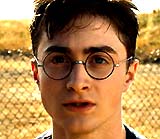
Harry Potter
(Daniel Radcliffe)
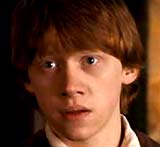
Ron Weasley
(Rupert Grint)
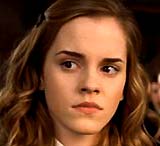
Hermione Granger
(Emma Watson)
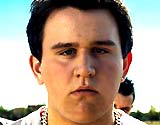
Dudley Dursley
(Harry Melling)
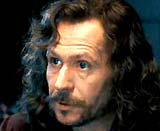
Sirius Black
(Gary Oldman)
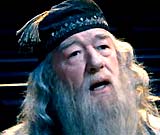
Albus Dumbledore
(Michael Gambon)
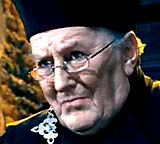
Cornelius Fudge
(Robert Hardy)
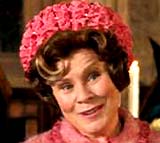
Dolores Umbridge
(Imelda Staunton)
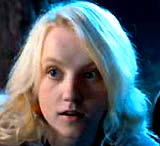
Luna Lovegood
(Evanna Lynch)
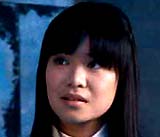
Cho Chang
(Katie Leung)
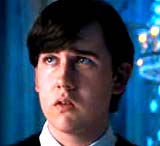
Neville Longbottom
(Matthew Lewis)
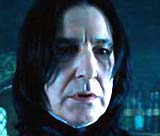
Professor Severus Snape
(Alan Rickman)
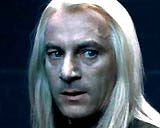
Lucius Malfoy
(Jason Isaacs)
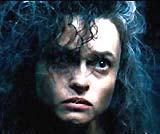
Bellatrix Lestrange
(Helena Bonham Carter)
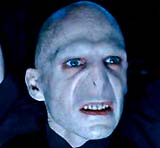
Lord Voldemort
(Ralph Fiennes)
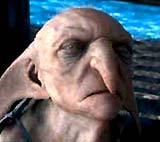
House-elf Kreacher
(Timothy Bateson)
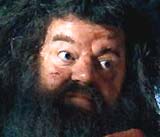
Rubeus Hagrid
(Robbie Coltraine)
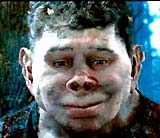
Giant Grawp
(Tony Maudsley) |
































